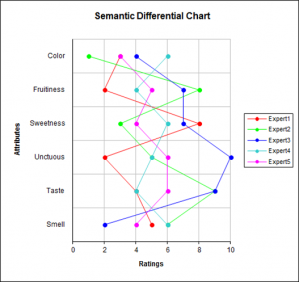Semantic differential charts
Semantic differential charts allow to visualize different connotations individuals may have for a certain word. Available in Excel using the XLSTAT software.

What is a semantic differential chart
The semantic differential function is a visualization method that has been developed by the psychologist Charles E. Osgood in order to plot the differences between individuals' connotations for a given word. When applying the method, Osgood asked survey participants to describe a word on a series of scales ranging from one extreme to the other (for example favorable/unfavorable). When patterns were significantly different form one individual to the other or from one group of individuals to the other, Osgood could then interpret the Semantic Differential as a mapping of the psychological or even behavioral distance between the individuals or groups.
Use of semantic differential charts
This method can also be used for a variety of applications:
- Analysis of the experts’ perceptions for a product (for example a yogurt) described by a series of criteria (for example, acidity, saltiness, sweetness, softness) on similar scales (either from one extreme to the other, or on a similar like scale for each criterion). A Semantic differential chart will allow you to quickly see which experts agree, and if significantly different patterns are obtained.
- Survey analysis after a customer satisfaction survey.
- Profile analysis of candidates during a recruitment session.

